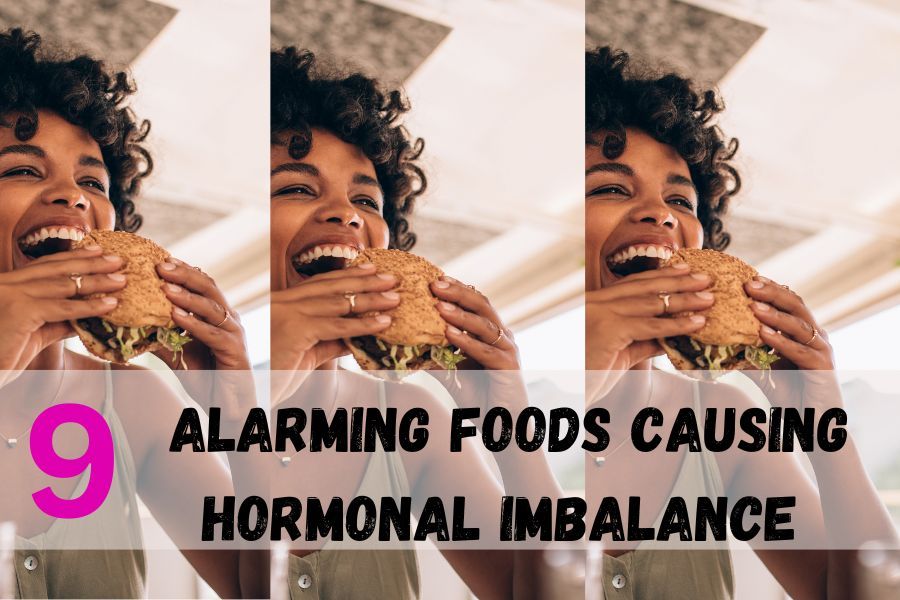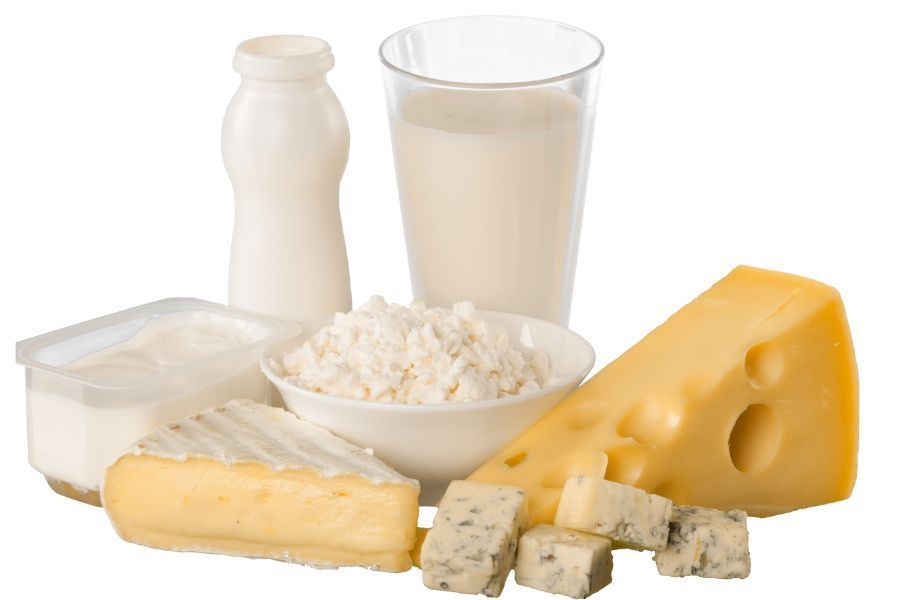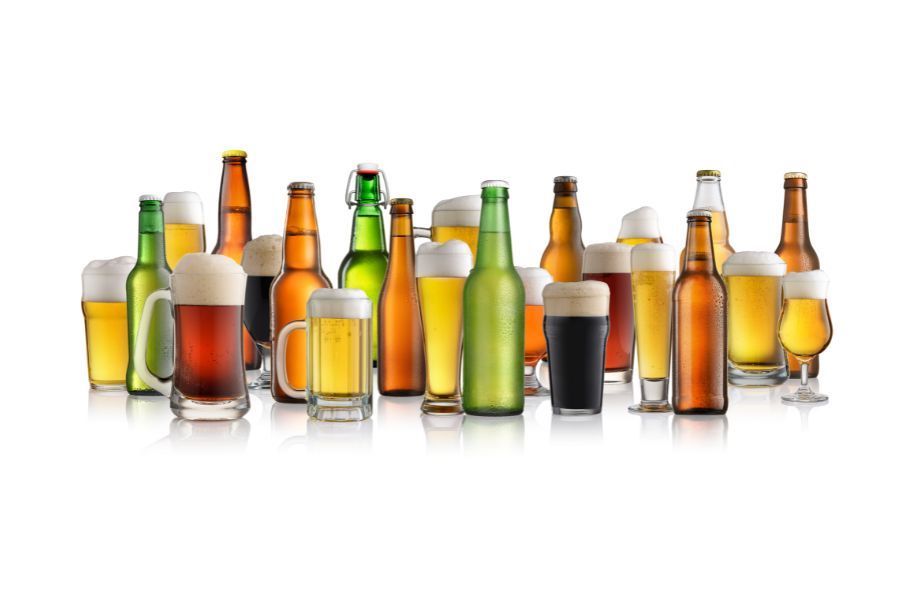Hormonal imbalance is a common health issue among women, and it can have several causes. One of the leading factors contributing to hormonal imbalances in females is their diet. The foods we consume have a significant impact on our hormones, and some can even disrupt the delicate balance of hormones in our bodies.
In this article, we will discuss the top foods that cause hormonal imbalances in females.

High Glycemic Foods
Foods with a high glycemic index, such as refined carbohydrates and sugary drinks, can cause a spike in blood sugar levels. This sudden increase triggers the release of insulin, which can lead to an overproduction of testosterone and estrogen. These hormones are responsible for regulating the female reproductive system, and an imbalance can cause irregular periods, acne, and even fertility issues.
Foods High in Sugar
Sugar is a primary component in many daily consumed products. While it grants a delightful taste, it can also cause hormonal imbalances. Here is a list of foods that are high in sugar:
- Soda and other sugary drinks: These are often loaded with high-fructose corn syrup, a common source of excessive sugar intake.
- Candy and sweets: These foods are almost entirely made up of sugar.
- Baked goods: Cookies, cakes, and other baked goods often contain high amounts of sugar, which can lead to hormonal imbalance.
- Fruit juice: While fruit juice may seem healthy, many types are loaded with sugar.
- Cereal: Many breakfast cereals are high in sugar, even those marketed as “healthy”.
- Processed food: Ready-made meals and snacks often have added sugar to enhance their flavor.
- Jarred sauces and dressings: Many packaged sauces, dressings, and condiments can contain hidden sugars.
- Ice cream: This delicious treat is a significant source of sugar.
- Energy Drinks: These are typically high in sugar and can lead to hormonal imbalances when consumed in excess.
It’s essential to note that sugar isn’t always bad – it’s about balance. However consuming these foods regularly and in high amounts can lead to hormonal imbalances in females.

Dairy Products
Dairy products are often a staple in many diets, but they can also be a culprit for hormonal imbalances. Milk contains natural hormones produced by cows that can interfere with our own hormone production. Additionally, dairy products are high in saturated fats, which can increase estrogen levels and disrupt the hormonal balance in females.
Common Dairy Products that May Cause Hormonal Imbalance
While not everyone is sensitive to dairy, for those who are, it can potentially lead to hormonal imbalance. Below are some of the most common dairy products that can contribute to this issue:
- Milk: This is the primary dairy product and is often consumed daily. Both whole and skimmed milk can contribute to hormonal imbalances due to their hormone content.
- Cheese: From cheddar to mozzarella, cheese is a beloved dairy product that can cause hormonal imbalances in some females.
- Yogurt: Although it is often marketed as a healthy dairy product, yogurt—especially the flavored types—can be high in sugar and could potentially lead to hormonal issues.
- Butter: A common ingredient in cooking and baking, butter is a source of saturated fats that can disrupt hormonal balance if consumed excessively.
- Cream and Cream-Based Products: Cream, as well as foods made with cream such as ice cream or cream-based sauces, can potentially lead to hormonal imbalance due to its high-fat content.
- Cottage Cheese: Despite its high protein content, cottage cheese can cause hormonal imbalance when consumed in large amounts due to its dairy content.
- Condensed and Evaporated Milk: These highly processed dairy products are used in many sweet dishes and can contribute to hormonal imbalance due to their high sugar and fat content.
If you suspect dairy is contributing to your hormonal imbalance, it’s worth considering alternatives such as almond milk, soy milk, and coconut milk, which can be healthier substitutes. However, any dietary changes should be made after consulting with a healthcare professional.
Soy Products
Soy products, such as tofu and soy milk, are often marketed as a healthy alternative to animal-based products. However, they contain phytoestrogens, plant compounds that mimic estrogen in the body. Consuming too much soy can lead to an excess of estrogen in the body, causing hormonal imbalances. This is especially concerning for women who have a history of breast cancer, as excess estrogen can stimulate the growth of cancer cells.
List of Soy Products That May Contribute to Hormonal Imbalance
While soy is a popular protein alternative, especially for vegetarians and vegans, it’s essential to be aware of its potential impact on hormonal balance. Here are some common soy-based foods that, when consumed excessively, could lead to hormonal imbalance:
- Tofu: Made from condensed soy milk, tofu is a protein-rich food that contains phytoestrogens.
- Soy Milk: This is a common alternative to cow’s milk, but it contains high levels of phytoestrogens.
- Soy Sauce: Frequently used in Asian cooking, soy sauce is made from fermented soybeans and can contribute to hormonal imbalance when used excessively.
- Edamame: These are immature soybeans that are often consumed as a snack. Despite their nutritional value, their high phytoestrogen content could lead to hormonal imbalance.
- Tempeh: This is a traditional Indonesian product made from fermented soybeans. It’s high in protein and vitamins but also contains phytoestrogens.
- Soy Protein Isolate: Often found in protein bars and meal replacement shakes, this processed form of soy can be particularly high in phytoestrogens.
- Miso: A traditional Japanese paste made from fermented soybeans, miso is often used in soups and sauces. Despite its health benefits, the phytoestrogens it contains could affect hormonal balance.
- Soybean Oil: This is one of the most commonly used cooking oils, and its excessive use can lead to hormonal imbalance.
While these foods are not inherently bad and provide many nutritional benefits, moderation is key. If you’re concerned about hormonal imbalances, consider limiting your intake of these foods and monitor how your body responds. Always consult with a healthcare professional before making significant changes to your diet.

Caffeine
Many people rely on caffeine to kickstart their day, but excessive caffeine consumption can cause hormonal disruptions in females. Caffeine stimulates the release of cortisol, also known as the stress hormone, which can throw off the balance of other hormones in the body. This can lead to irregular periods, mood swings, and sleep disturbances.
List of Caffeinated Products That May Contribute to Hormonal Imbalance
Caffeine as a stimulant can have a significant impact on hormonal balance when consumed in excess. Below, we have listed common caffeinated products that could potentially lead to hormonal imbalance in females:
- Coffee: As one of the most popular sources of caffeine, regular and excessive coffee consumption can lead to hormonal imbalance.
- Tea: Though it contains less caffeine than coffee, certain types of tea, like black and green, can contribute to hormonal imbalance when consumed in large amounts.
- Energy Drinks: These drinks are not only high in caffeine but also in sugar, making them a potential source of hormonal imbalance.
- Soda: Many types of soft drinks contain caffeine and are also high in sugar, which can disrupt hormonal balance.
- Chocolate: Particularly dark chocolate and cocoa powder can contain significant amounts of caffeine.
- Pre-Workout Supplements: These often contain high levels of caffeine to increase energy and focus during exercise, but they can also lead to hormonal imbalance when used frequently.
- Over-The-Counter Pain Relievers: Some pain relievers contain caffeine, which can contribute to hormonal imbalance if used regularly.
Remember, moderation is key when it comes to consuming caffeine. If you suspect that caffeine is contributing to your hormonal imbalance, consider reducing your intake and consult with a healthcare professional.
Processed and Fried Foods
Processed and fried foods are often high in unhealthy fats and sugar, which can contribute to weight gain. Excess fat cells can produce more estrogen, leading to an imbalance in hormone levels. Additionally, these foods often contain additives and preservatives that can disrupt the endocrine system, which is responsible for producing and regulating hormones.
List of Processed and Fried Foods That May Contribute to Hormonal Imbalance
Processed and fried foods, due to their high content of unhealthy fats, sugar, and preservatives, can potentially disrupt hormonal balance. Here are some common processed and fried foods to be aware of:
- Potato Chips and French Fries: These popular snacks and side dishes are often deeply fried and high in trans fats and sodium.
- Processed Meats: This includes items like bacon, hot dogs, and lunch meats, which are often high in sodium, nitrates, and other preservatives.
- Fast Food Burgers: These are often made with processed meats and served with cheese and sauces that are high in unhealthy fats and sugar.
- Frozen Meals: While convenient, these are often loaded with preservatives and sodium.
- Canned Vegetables and Soups: Though they may seem healthy, they often contain high amounts of sodium and preservatives.
- Pizza: Commercially prepared pizzas are often high in unhealthy fats, sodium, and processed meats.
- Bakery Items: Items like doughnuts, pastries, and cakes are high in sugar and trans fats.
- Microwave Popcorn: The bags are often lined with substances that can disrupt the endocrine system.
- Ice Cream: This dessert is high in sugar and often contains additives and preservatives.
Remember that consuming these foods occasionally won’t necessarily lead to hormonal imbalance, but regular, excessive intake could pose a risk. Always consult a healthcare professional before making significant changes to your diet.

Alcohol
Alcohol consumption can also contribute to hormonal imbalances in females. Heavy drinking can damage the liver, which plays a crucial role in metabolizing hormones. This can lead to an excess of estrogen and disruptions in other hormone levels. Additionally, alcohol can increase cortisol levels, leading to a domino effect on other hormones in the body.
List of Alcoholic Beverages That May Contribute to Hormonal Imbalance
Alcohol, in moderation, can be a part of a balanced lifestyle. However, excessive consumption can potentially lead to hormonal imbalances. Here are some common alcoholic beverages to be cautious of:
- Beer: Regular and excessive consumption of beer can increase estrogen levels in the body due to the presence of phytoestrogens found in hops.
- Wine: Both red and white wines have the potential to disrupt hormonal balance when consumed frequently and in large quantities.
- Spirits: High-alcohol spirits such as vodka, whiskey, tequila, rum, and gin may contribute to hormonal imbalance, particularly when consumed in large amounts.
- Liqueurs: These sweetened spirits often contain sugar and additives that can also interfere with hormonal balance.
- Cocktails: Mixed drinks, which often contain high levels of sugar in addition to alcohol, can contribute to hormonal imbalance.
- Hard Ciders: Like beer, cider can also contain phytoestrogens and might disrupt hormonal balance with excessive consumption.
- Alcopops: These pre-mixed sweet drinks are loaded with sugar and can cause both weight gain and hormonal imbalance.
Remember, moderation is key when it comes to consuming alcohol. If you suspect that alcohol is contributing to your hormonal imbalance, consider reducing your intake and seek advice from a healthcare professional.
Conclusion
Maintaining a healthy and balanced diet is crucial for overall well-being, including hormone balance. By avoiding or limiting these foods that cause hormonal imbalances in females, we can better support our bodies’ natural hormone production and avoid potential health issues. Remember to consult with your healthcare provider if you have concerns about your hormonal balance and to always practice moderation in food and drink consumption. Let’s prioritize our health and make informed decisions for our bodies. So, it is important to be mindful of what we put into our bodies and how it can potentially impact our hormonal health.
With the right knowledge and support from healthcare professionals, we can strive towards a healthier lifestyle that promotes hormonal balance. So, make informed decisions for your body and prioritize your health by being mindful of the foods you consume. Let’s strive towards a balanced diet that supports our bodies’ natural hormone production and overall well-being. In addition, regular exercise, stress management, and sufficient sleep are also essential factors in maintaining hormonal balance. Take care of your body and prioritize self-care for a healthier and happier you. So, let’s make conscious choices for our health and well-being by being mindful of the foods we eat. Your body will thank you for it!
Keep in mind that hormonal imbalances can have various underlying causes, and it is essential to consult with a healthcare professional to address any concerns or symptoms you may have. By making informed decisions about our diet and lifestyle, we can better support our bodies in maintaining hormonal balance and overall wellness. Let’s prioritize our health and well-being by being mindful of the foods we consume and taking care of ourselves holistically. Remember, small changes can lead to significant improvements in our physical and emotional health. So, let’s start making healthy choices today for a better tomorrow.
References:
- Harvard T.H. Chan School of Public Health. (2019). The Nutrition Source. https://www.hsph.harvard.edu/nutritionsource/
- Mayo Clinic. (2019). Healthy Lifestyle: Nutrition and Healthy Eating. https://www.mayoclinic.org/healthy-lifestyle/nutrition-and-healthy-eating/in-depth/art-2004589
If you enjoyed this article, don’t forget to share! Check out related post here.
I’m curious to hear about your thoughts on this topic. Please comment below and share so that we can create a more greener and holistic community.


Very informative and helpful
Very informative.